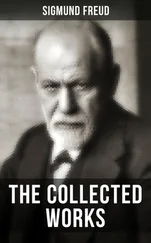A fourth type of relation between the manifest and the latent dream cannot be dealt with until its cue in the technique has been given. Even then I shall not have given you a complete enumeration, but it will be sufficient for our purpose.
Have you the courage to venture upon the interpretation of an entire dream? Let us see if we are well enough equipped for this undertaking. Of course, I shall not choose one of the most obscure, but one nevertheless that shows in clear outline the general characteristics of a dream.
A young woman who has been married for many years dreams: " She is sitting in the theatre with her husband; one side of the orchestra is entirely unoccupied. Her husband tells her that Elise L. and her bridegroom had also wished to come, but had only been able to procure poor seats, three for
Конец ознакомительного фрагмента.
Текст предоставлен ООО «ЛитРес».
Прочитайте эту книгу целиком, купив полную легальную версию на ЛитРес.
Безопасно оплатить книгу можно банковской картой Visa, MasterCard, Maestro, со счета мобильного телефона, с платежного терминала, в салоне МТС или Связной, через PayPal, WebMoney, Яндекс.Деньги, QIWI Кошелек, бонусными картами или другим удобным Вам способом.
"Fehl-leistungen."
In the German, the correct announcement is, "Connetable schickt sein Schwert zurück." The novice, as a result of the suggestion, announced instead that "Komfortabel schickt sein Pferd zurück."
"Aufstossen" instead of "anstossen."
"Begleit-digen" compounded of "begleiten" and "beleidigen."
"Briefkasten" instead of "Brütkasten."
"Geneigt" instead of "geeignet."
"Versuchungen" instead of "Versuche."
"Aufgepatzt" instead of "aufgeputzt."
"Angenommen" is a verb, meaning "to accept."
The young man here said "aufzustossen" instead of "anzustossen."
Prof. Freud here gives the two examples, quite untranslatable, of "apopos" instead of "apropos," and "eischeiszwaibehen" instead of "eiweiszscheibehen."
From C. G. Jung.
From A. A. Brill.
From B. Dattner.
So also in the writings of A. Maeder (French), A. A. Brill (English) J. Stärke (Dutch) and others.
From R. Reitler.
In the German Reichstag, November, 1908. "Rückhaltlos" means "unreservedly." "Rückgratlos" means "without backbone."
"Zum Vorschein bringen," means to bring to light. "Schweinereien" means filthiness or obscurity. The telescoping of the two ideas, resulting in the word "Vorschwein," plainly reveals the speaker's opinion of the affair.
The lady meant to say "Nach Hause," "to reach home." The word "Hose" means "drawers." The preservating content of her hesitancy is hereby revealed.
The German reads, "bei meinen Versuchen an Mausen," which, through the slip of the pen, resulted in "bei meinen Versuchen an Menschen."
"Angenommen" is a verb, meaning "to accept."
Josef Breuer, in the years 1880-1882. Cf. also my lectures on psychoanalysis, delivered in the United States in 1909.
The reader will recall the example: "things were re-filled."
From the sublime to the ridiculous is but a narrow passage.
Yes, the passage from Calais.
"Vorzug." "Vom Bett hervorziehen."
"Schränkt sich ein."












